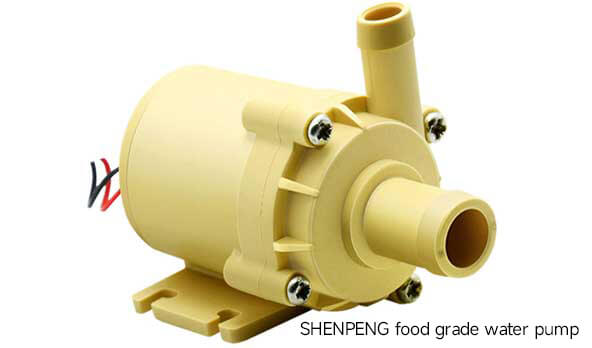Micro food grade water pumps play a crucial role in the food and beverage industry. They are not only responsible for the transportation of liquids, but also directly related to the quality and safety of products. Therefore, when choosing a micro food grade water pump, multiple factors must be considered comprehensively to ensure its performance and applicability. Here are some key considerations:

1. Food grade water pumps should choose material compatibility
Firstly, ensure that the material of the water pump is safe when in direct contact with food or beverages. Food grade water pumps typically use stainless steel, plastic (such as polypropylene, polyethylene), or other materials that meet food contact standards. These materials should be non-toxic, odorless, and not release any harmful substances into food. Avoid using materials that may contaminate food or affect food quality.
2. Size
Choose the appropriate pump size based on the amount of liquid to be transported and space constraints.
3. Sealing performance
Good sealing performance is the key to preventing liquid leakage and avoiding food contamination. Choose water pumps with reliable sealing designs, such as mechanical seals or magnetic drive seals, to ensure that no leakage occurs during use. The material of the seal also needs to meet food contact standards and should be easy to replace and maintain.
4. Power
The power of a water pump affects its working efficiency and energy consumption, and choosing the appropriate power can ensure a balance between efficiency and cost.
5. Flow and head requirements
Determine the required pump flow rate and head based on specific application requirements. Flow rate refers to the amount of liquid that a pump can transport per unit time, while head refers to the height at which the pump can lift the liquid. Ensure that the water pump can meet the liquid transportation requirements during the production process, and avoid affecting production efficiency and product quality due to insufficient flow or head.
6. Certification and Standards
Choose water pumps that comply with relevant food industry certifications and standards, such as NSF/ANSI, FDA, EHEDG, etc. These certifications can ensure that water pumps meet hygiene and safety requirements, providing strong guarantees for food safety. Before purchasing, it is essential to verify the certification status of the water pump and consult relevant certification documents and test reports.
7. Reliability and Durability
Consider the reliability and durability of the water pump to ensure long-term stable operation. Choose well-known brands and manufacturers with good reputations, who usually provide quality assurance and after-sales service.
8. Maintenance and upkeep
Understand the maintenance and upkeep requirements for water pumps, including regular inspections, cleaning, and replacement of vulnerable parts. Choosing pumps that are easy to maintain can reduce operating costs and downtime. At the same time, it is important to understand the manufacturer's after-sales service policies, such as whether there are warranty, repair, and other services, as well as the response speed and service quality of after-sales services, to ensure timely technical support and assistance during use.
9. Environmental factors
Environmental protection has become a key concern in various industries. When choosing a micro food grade water pump, one can consider choosing products that are environmentally friendly, low-noise, efficient, and energy-saving. This not only helps to reduce the impact on the environment, but also saves energy costs for businesses.
10. Price
Choose the appropriate water pump based on the budget, but don't just rely on price as the determining factor. Quality and performance are equally important.
11. Brand and after-sales service
Choosing a well-known brand of water pump can usually provide better quality and after-sales service.
conclusion
Choosing a suitable micro food grade water pump requires comprehensive consideration of multiple factors, including material compatibility, size, sealing performance, power, power, flow and head requirements, certification and standards, reliability and durability, maintenance and upkeep, environmental factors, price, and brand and after-sales service. By carefully evaluating and comparing the performance and characteristics of different products, one can choose the most suitable water pump for their needs, providing strong guarantees for food safety and production efficiency.
Address:No.30, Dapu lndustrial Street, Changping, Dongguan, Guangdong, China
Tel: +86-186 7628 8117